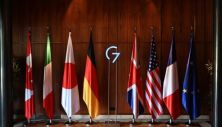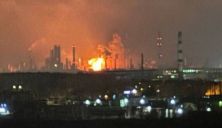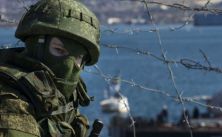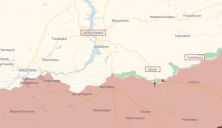We have discussed the Ukrainian “needs” and American “cans” with a diplomat and a former Ambassador of the United States to Ukraine, John Herbst.
He said that America must send Tomahawk missiles to Ukraine and destroy everything of military importance in Russia itself and let Ukraine win. In his opinion, this will greatly improve the overall stability of the world.
— The first question of mine will be about U.S. foreign policy, particularly one that would put an end to the enlargement of what we call the “Axis of Evil.” We see Russia, Iran, and North Korea, etc., gathering forces together, and the U.S., as the global leader, can put an end to that. So, what foreign policy will stop this integration?
— Well, first, I welcome the question. The growing cooperation in an aggressive fashion of these four countries is the great national security challenge of this era. I don’t know if the United States could put an end to it, but I have no doubt that decisive American leadership would blunt the threat and make the world much more secure than it will be if we continue to see inadequate American leadership.
Unfortunately, this danger—the danger of these four acting together against the United States and its allies—was not really brought up in this presidential campaign. But certainly, whoever wins, whether it’s Harris or Trump, will face this danger when they assume the presidency in late January.
The key, in my judgment, to managing this crisis and blunting the malign influence of these four countries is, first and foremost, enabling Ukraine to win its war against Moscow’s aggression. That would happen if the United States armed Ukraine appropriately, stopped limiting what it sends.
For example, we should be sending Tomahawk missiles to Ukraine, allowing them to strike at any strategic target, including in Russia.
But also, we should not be holding Israel back as it strikes against Iranian aggression. Netanyahu has done more for American security in the past several months with his weakening of Hezbollah and his strikes on Iran than Biden has. I don’t say that with any pride.
— Just before I come to my next question, I know you’ve been involved in the cooperation between the U.S. and Ukraine when you were Ambassador. Did you think back then, in the late 2000s and pre-2010s, that a war between such a state as Ukraine and Russia was possible, and that Russia would again be a threat to America?
— I was Ambassador to Ukraine from 2003 to 2006 during the Orange Revolution, and Moscow’s U intervention behind the scenes, and for that matter, via its media and statements and visits made by Putin to Ukraine, was a substantial intervention in Ukraine’s politics, but an intervention that failed.
I can’t say in 2006 I thought that Russia might invade Ukraine, but I did think Russia was a threat to Ukraine. Once the Maidan revolution took place, I can’t say I was surprised when Russia took Crimea. I was a bit surprised when they began the war in Donbas. Yes, that’s been a longstanding history of bilateral security cooperation between America and Ukraine. What I see now is that Ukraine is extremely dependent on American political and military aid.
— Do you see any strategy for Ukraine to become more self-sufficient in opposing any possible threat from the east and north, from Russian territory?
— I think the Ukrainian government, led by Zelenskyy, and the Ukrainian people have performed brilliantly and bravely in response to the Russian massive invasion. Of course, given the size of their economy, the size of their arms industry, and the resources Ukraine has, it requires arms and economic aid from the United States, the EU, and other defenders of freedom. That’s inevitable.
Ukraine has done a wonderful job using its own resources to defend itself. What we’ve seen Ukraine do with drones, both naval and air, is simply astonishing, and it’s been one of the reasons for their success on the battlefield. But you know, the United States is not giving Ukraine a gift when it sends arms or economic aid. It’s defending its own interest because while our politicians don’t talk about this every day, Putin or someone senior in Moscow calls America adversary number one. We know that Putin is actively working to undermine American interests, American strength, and American leadership globally. He’s not the only one.
We are seeing Iran’s involvement and threats to disrupt the presidential election right now. The number one adversary of North Korea is officially recognized as the United States. So, all these countries are cooperating and seeing the U.S. as their main enemy. What’s happening right now is the battlefield in Ukraine. We have confirmation of North Korean soldiers being in active combat with Ukrainian forces just today.
— Do you see any answer coming soon from NATO and the U.S. military possibly because of this first combat?
— First, I must mention the fourth country, the most dangerous in the long run, which also sees the United States as an adversary, although it doesn’t say that: China.
So, the growing cooperation of these four revisionist actors, all pursuing policies designed to weaken the United States, is easily the great national security challenge of this era. While you have a growing number of foreign policy experts who recognize this, American policy has not quite recognized this to this date. I think we see the Biden team stumbling in the direction of recognizing it, but stumbling in that direction—not walking clearly and firmly in that direction.
On the Trump side, I know that the sound people in his foreign policy camp, like Pompeo and O’Brien, understand it and have even said it. Republicans in the Senate and the House recognize it. But there’s another group in Trump’s world that’s clueless about the danger that Moscow poses to us. They deny that Russia is working with China and Iran, and it’s harder for them to deny it now that it’s working with North Korea. Even though that camp sees China, North Korea, and Iran as a problem for the United States, they refuse to see the obvious truth that Putin calls us adversary number one, and he is the most aggressive of the actors working against the United States.
This issue has not really become a matter of discussion during the campaign, and it’s a failure of our media to force the candidates to speak about it. But again, the next president is going to face this danger. I hope that there will be sane decisions regarding this national security threat of global size.
— Returning to the question of Ukraine and my final question: You have great experience in life, politics, and diplomacy. Do you see any possible resolution to the active phase of the war? I’m noting that active phase—not the passive confrontation—in the foreseeable future in Ukraine. Are we striking this never-ending conflict, or is there a possible end to it?
— My sense is that if Harris wins, we’ll see a continuation of Biden’s policy. If she is unable, or her administration is unable, to get an additional aid package through Congress, I think she’d be able to get it, but if she’s not able to get it, that would put Ukraine in a very difficult situation. If she pursues the same policies as Biden, with timidity in providing arms, that will make Ukraine’s position harder with each passing month, and that could ultimately lead to an unsatisfactory negotiation, which would be a clear step towards Moscow’s eventual domination of Ukraine.
If Trump wins again, it depends on which set of advisors wind up driving the policy. If it’s people like Pompeo and O’Brien, we’ll see a stronger policy than we do right now under Biden. If it’s the other crowd, we could see simply appeasement of Russia, and giving Putin Russia by ending all American assistance.
Trump has said he will get a peace deal quickly if he gets it by strengthening Ukraine for a successful negotiation of a fair peace—not a bad policy. But if he gets it by denying aid to Ukraine and forcing Ukraine into submission, that would be a policy that would remind the world of Neville Chamberlain, and it would make Biden’s disastrous withdrawal from Afghanistan look like a small mistake.
Read also: Peter Dickinson: The West Is Tested Now, and It Fails










